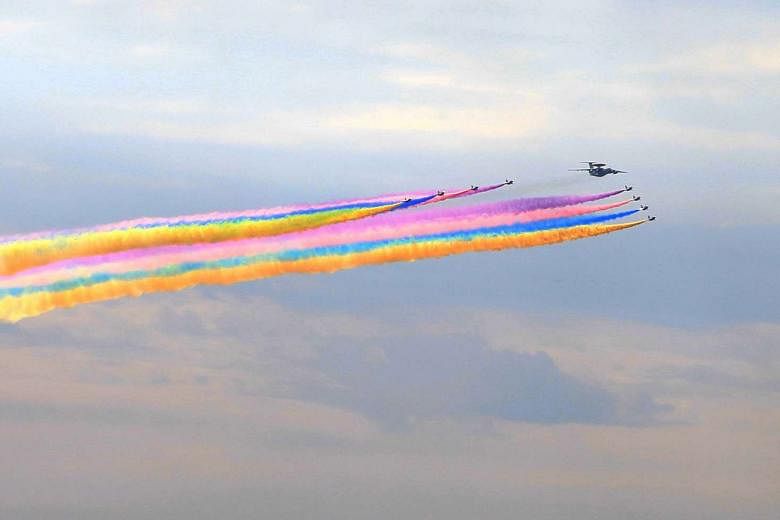BEIJING • China yesterday issued a list of world leaders who will be attending next week's huge military parade to mark Japan's defeat in World War II, but notable among the names are the missing ones.
The display, a show of strength which comes as Beijing takes a more assertive stance regionally, will see 12,000 soldiers and 500 pieces of hardware rolling through Tiananmen Square, with almost 200 aircraft flying overhead.
Chinese officials listed 24 heads of state and government as attending, with Russian President Vladimir Putin, South Korea's Park Geun Hye and South Africa's Jacob Zuma among the most prominent. United Nations secretary-general Ban Ki Moon will also be attending.
Former deputy prime minister Wong Kan Seng will be Singapore's representative at the parade.
Among the absentees on the list is North Korean leader Kim Jong Un, who has yet to visit Beijing despite China being his country's key diplomatic protector. Pyongyang is sending Politburo member Choe Ryong Hae, officials said.
"It is up to foreign countries to decide on who to send," said Deputy Foreign Minister Zhang Ming. "As the old Chinese saying goes, 'whoever comes (through the door) is our guest'. We welcome them all."
China generally shies away from the vast annual demonstrations of military might that were a hallmark of the Soviet Union, normally holding such events once a decade to mark the foundation of the People's Republic. It has struggled to attract worldwide interest for the parade as world leaders are wary of the tone of the event, and the risk of lending it legitimacy.
Beijing is becoming increasingly assertive in the region and regularly accuses Tokyo of failing to show sufficient contrition for Japan's 20th-century invasion of China.
The conflict is officially known in the country as the "Chinese people's war of resistance against Japanese aggression and the world anti-fascist war".
"The commemorations do not target any specific country, neither today's Japan nor the Japanese people in general," Mr Zhang said.
But Japanese Prime Minister Shinzo Abe is not going. No official representative of Tokyo will be there either. Former prime minister Tomiichi Murayama - who issued a landmark apology for the war in 1995 - will attend in a personal capacity.
The only European Union head of state or government named as attending is Czech President Milos Zeman. France and Italy will send their foreign ministers, officials said, but the governments of the United States, Germany and Canada will be represented only by their resident ambassadors.
Former British prime minister Tony Blair will also attend, but not in an official capacity.
A total of 17 countries are sending troops to take part, including Russia, Cuba, Serbia and Mexico, along with several of China's neighbours.
Chinese President Xi Jinping attended a similar parade in Moscow in May commemorating victory over Nazi Germany. Mr Xi and Mr Putin hold frequent summits and their countries often take similar stances there on divisive issues.
Chinese troops were largely an underground force during World War II, with the brunt of the campaign against the Japanese fought by soldiers of the country's then Nationalist government led by Mr Chiang Kai-shek. AGENCE FRANCE-PRESSE

